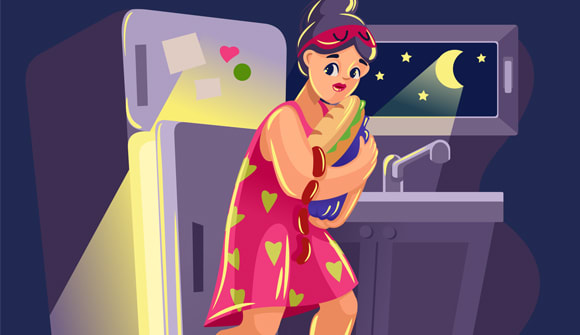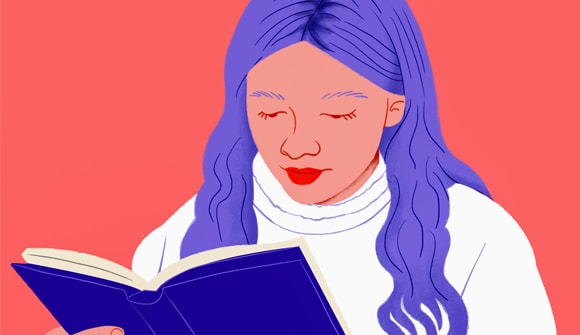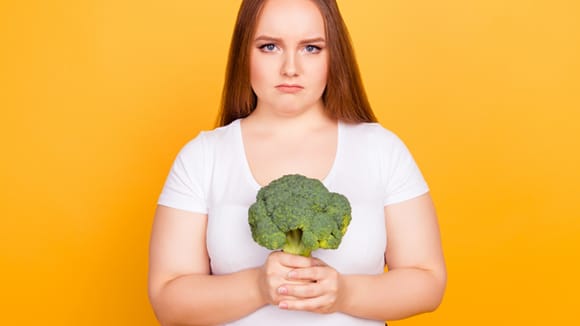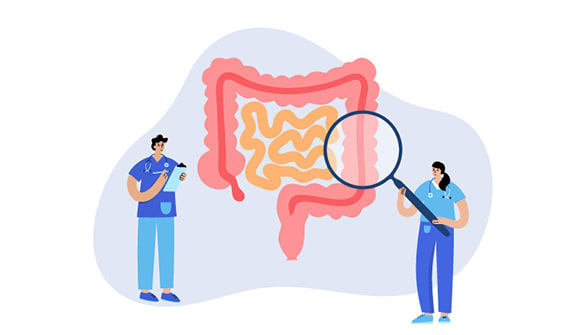Nighttime nibbles
How midnight snacks can affect your sleep.
Article Date:

Evenings are what most people consider their “me” time. Whether you’ve just worked a full day, put the kids to bed, crossed some chores off your list, or completed a combination of these or other tasks, the time before you go to bed can feel like the only time you have to relax. For a lot of people, that involves watching TV and snacking.
“We tend to use food to relax, feel better and cope with our emotions, even if it’s not intentional,” Emily White, PhD, a Baptist Behavioral Health clinical psychologist who specializes in sleep and eating habits, explained.
However, eating late at night can affect how well you sleep. Dr. White helped break down the best foods and times to eat, and how to tell the difference between true hunger and cravings.
Snack time
A recent study showed people who ate within three hours of bedtime woke up more throughout the night than those who didn’t eat anything. The reason? The same energy the body receives through food will keep the body active throughout the night.
“I suggest people stop eating about three hours before bedtime,” said Dr. White.
Timing guidelines don’t just apply to food, but also for drinks that contain caffeine. Our bodies take around 5-7 hours to break down half of the amount of caffeine consumed. That means if you have a cup of coffee at 3 pm, half of the caffeine will still be in your system at 9 pm.
“Some people say caffeine doesn’t affect them, but if you’re having any trouble falling asleep or staying asleep, caffeine is the likely culprit,” said Dr. White. “I recommend cutting out caffeine completely to see if your sleep improves.”
Additionally, drinking alcohol too close to bedtime may cause you to wake frequently throughout the night.
“A lot of times, alcohol can make people feel sleepy, so they have a drink before bed. They think it will help them relax and fall asleep faster,” Dr. White explained. “While it may make you drowsy, the alcohol interrupts your deep sleep and causes you to be restless all night.”
That’s part of the reason people get hangovers. If you plan to have a glass of wine or other drink, Dr. White suggested stopping 2-3 hours before bed.
Craving calories
If you tend to gravitate toward junk food late at night, you’re not alone.
“When people are sleep-deprived it affects the kinds of foods they crave,” said Dr. White. “Those who haven’t slept will often choose foods high in carbohydrates and calories, such as pizza or bread, over healthier options like fruits or vegetables. This could be because the body is lacking energy and craves high-energy (high-calorie) foods to replenish itself as quickly as possible.”
Additionally, lack of sleep causes physiological changes in the body. When we don’t get enough sleep, our fullness hormone decreases and our hunger hormone increases. Therefore, we tend to feel hungrier.
“It shows us how closely related sleep and eating are,” said Dr. White. “If you eat ‘unhealthy’ food before bed, then you’re less likely to sleep well. Then, when you don’t sleep well, you crave more of those unhealthy foods.”
Hunger or craving?
It's important to know the difference between head hunger and belly hunger, Dr. White explained.
“Stomach or belly hunger is legitimate. Your stomach is rumbling and you may feel lightheaded,” she said. “Head hunger is a craving. You see something and think you want it.”
To differentiate between the two, she recommended waiting 10-15 minutes after you get an urge to eat. If you’re still hungry, or possibly even hungrier than before, then it’s probably true hunger. If your desire to eat decreases, then it might just be a craving.
In addition to waiting it out, she also suggested the apple test.
“Go eat an apple,” Dr. White recommended. “If your hunger goes away or decreases, then it is probably hunger. If it doesn’t, then it is probably a craving.”
If your late-night cravings are affecting your daily life, Baptist Behavioral Health providers are here to help. Call 904.376.3800 to make an appointment with a mental health professional. For sleep problems, contact the Baptist Health Behavioral Sleep Medicine Program.



